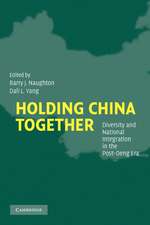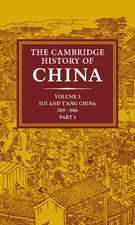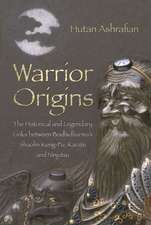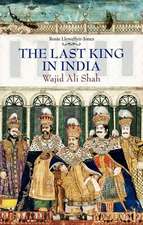Across Forest, Steppe, and Mountain: Environment, Identity, and Empire in Qing China's Borderlands: Studies in Environment and History
Autor David A. Belloen Limba Engleză Hardback – 3 feb 2016
Din seria Studies in Environment and History
-
 Preț: 231.59 lei
Preț: 231.59 lei -
 Preț: 191.12 lei
Preț: 191.12 lei -
 Preț: 243.02 lei
Preț: 243.02 lei -
 Preț: 188.70 lei
Preț: 188.70 lei -
 Preț: 204.55 lei
Preț: 204.55 lei -
 Preț: 147.64 lei
Preț: 147.64 lei -
 Preț: 201.67 lei
Preț: 201.67 lei -
 Preț: 137.74 lei
Preț: 137.74 lei - 14%
 Preț: 771.56 lei
Preț: 771.56 lei -
 Preț: 231.54 lei
Preț: 231.54 lei -
 Preț: 156.89 lei
Preț: 156.89 lei -
 Preț: 239.72 lei
Preț: 239.72 lei -
 Preț: 200.99 lei
Preț: 200.99 lei -
 Preț: 206.52 lei
Preț: 206.52 lei -
 Preț: 199.05 lei
Preț: 199.05 lei -
 Preț: 431.15 lei
Preț: 431.15 lei -
 Preț: 322.04 lei
Preț: 322.04 lei -
 Preț: 204.48 lei
Preț: 204.48 lei -
 Preț: 299.23 lei
Preț: 299.23 lei -
 Preț: 332.81 lei
Preț: 332.81 lei -
 Preț: 239.55 lei
Preț: 239.55 lei -
 Preț: 225.79 lei
Preț: 225.79 lei -
 Preț: 285.93 lei
Preț: 285.93 lei -
 Preț: 270.25 lei
Preț: 270.25 lei -
 Preț: 208.68 lei
Preț: 208.68 lei -
 Preț: 275.85 lei
Preț: 275.85 lei -
 Preț: 323.05 lei
Preț: 323.05 lei -
 Preț: 234.83 lei
Preț: 234.83 lei -
 Preț: 272.97 lei
Preț: 272.97 lei - 11%
 Preț: 528.82 lei
Preț: 528.82 lei - 11%
 Preț: 432.64 lei
Preț: 432.64 lei -
 Preț: 252.69 lei
Preț: 252.69 lei -
 Preț: 278.72 lei
Preț: 278.72 lei - 14%
 Preț: 756.70 lei
Preț: 756.70 lei -
 Preț: 264.09 lei
Preț: 264.09 lei -
 Preț: 440.76 lei
Preț: 440.76 lei
Preț: 698.30 lei
Preț vechi: 784.61 lei
-11% Nou
Puncte Express: 1047
Preț estimativ în valută:
133.62€ • 140.15$ • 111.24£
133.62€ • 140.15$ • 111.24£
Carte tipărită la comandă
Livrare economică 01-15 aprilie
Preluare comenzi: 021 569.72.76
Specificații
ISBN-13: 9781107068841
ISBN-10: 1107068843
Pagini: 350
Ilustrații: 5 maps 9 tables
Dimensiuni: 158 x 235 x 25 mm
Greutate: 0.63 kg
Editura: Cambridge University Press
Colecția Cambridge University Press
Seria Studies in Environment and History
Locul publicării:New York, United States
ISBN-10: 1107068843
Pagini: 350
Ilustrații: 5 maps 9 tables
Dimensiuni: 158 x 235 x 25 mm
Greutate: 0.63 kg
Editura: Cambridge University Press
Colecția Cambridge University Press
Seria Studies in Environment and History
Locul publicării:New York, United States
Cuprins
Introduction; 1. Qing fields in theory and practice; 2. The nature of imperial foraging in the SAH basin; 3. The nature of imperial pastoralism in southern Inner Mongolia; 4. The nature of imperial indigenism in southwestern Yunnan; 5. Borderland Hanspace in the nineteenth century; 6. Qing environmentality.
Recenzii
'David A. Bello's book is important, innovative, well written, exceptionally researched, and deserving of an audience that extends beyond scholars of late imperial (or early modern) China to those interested in environmental history, ethnicity, empires, and the dynamics of the early modern world … this book is fabulous, engaging, intriguing, and awe-inspiring.' Robert A. Marks, Whittier College, California
'This is a multifaceted work of original and significant scholarship, complementing a general professional and publishing trend in environmental history relating both to China and to global history of the early modern period.' Pamela Crossley, Dartmouth College
'David A. Bello's comparative study makes important new contributions to the field through its nuanced analysis on the roles of ecology in configuring, constraining, and confounding state programs of frontier control. Challenging steady-state theories, Bello portrays the eighteenth-century economic and demographic expansions on Qing borderlands after they came under unified administration as unsustainable and poorly managed intensification.' Xiuyu Wang, Environmental History
'Bello's meticulously researched and eloquently written book will certainly resonate for environmental historians, but the story that emerges from this remarkable piece of scholarship extends well beyond environmental history.' Hang Lin, Asian Affairs
'This is a multifaceted work of original and significant scholarship, complementing a general professional and publishing trend in environmental history relating both to China and to global history of the early modern period.' Pamela Crossley, Dartmouth College
'David A. Bello's comparative study makes important new contributions to the field through its nuanced analysis on the roles of ecology in configuring, constraining, and confounding state programs of frontier control. Challenging steady-state theories, Bello portrays the eighteenth-century economic and demographic expansions on Qing borderlands after they came under unified administration as unsustainable and poorly managed intensification.' Xiuyu Wang, Environmental History
'Bello's meticulously researched and eloquently written book will certainly resonate for environmental historians, but the story that emerges from this remarkable piece of scholarship extends well beyond environmental history.' Hang Lin, Asian Affairs
Notă biografică
Descriere
Using Manchu and Chinese sources, this book explores the environmental history of Qing China's Manchurian, Inner Mongolian, and Yunnan borderlands.













